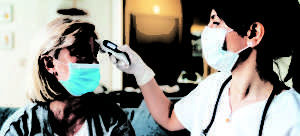Courtesy of Dr. Taba, Personalized Retina Care of Naples


Retinal specialists offices remained open following the guidelines of the ASRS (American Society of American Specialists) as they are considered essential healthcare providers due to the nature of retinal diseases. Retinal diseases are often silent (painless, not associated with redness of the eye) but potentially devastating to vision if not detected early. Among those are patients with macular degeneration that receive monthly treatment to prevent irreversible blindness. As physicians, we decide what patients have urgent problems that pose a greater threat to their vision than the risk of exposure to SARS-Cov-2.
The new CMS recommendations aim to give health care facilities guidance to provide essential non-COVID-19 care to patients who have no symptoms of COVID-19 (in regions with a low incidence of the disease).
The recommendations include:
• Health care providers and staff should wear surgical facemasks at all times and patients should wear a cloth face covering if they don’t possess surgical masks.
• Within the facility, administrative and engineering controls should be established to facilitate social distancing, such as minimizing time in waiting areas, spacing chairs at least six feet apart, and maintaining low patient volumes.
• Sanitation protocols should be in place providing for cleaning and disinfection of the facility and decontamination of anesthesia equipment pursuant to CDC guidelines.
• When adequate testing capability is established, patients should be screened by laboratory testing before care and staff should be regularly screened by lab test as well.
• All patients must be screened for potential symptoms of COVID-19 prior to entering the facility.
• Facilities should consider establishing non-COVID care (NCC) zones that would screen all patients for COVID-19 symptoms, including temperature checks.
• Staff should be routinely screened for symptoms of COVID-19.
• Adequate supplies of equipment, medication and supplies must be ensured and not detract from the community’s ability to respond to a potential surge.
COVID-19 and Eye Disorders
Dr. Katia Taba of Personalized Retina Care of Naples has implemented and follows all CDC guidelines and updates for the safety and treatment for her patients.
Conjunctivitis (pink eye) does not appear to be a common symptom or comorbidity of COVID-19. To corroborate this finding, a Chinese study from Wuhan recently published online at the American Academy of Ophthalmology journal (Ocular Findings and Proportion with Conjunctival SARS-COV-2 in COVID-19 Patients – Department of Ophthalmology, Renmin Hospital of Wuhan University, Wuhan, 430060, Hubei Province, People’s Republic of China) indicated that SARS-CoV-2 RNA could be detected in the conjunctival swabs of 2.5% (3/121) of COVID-19 patients. Among the 121 patients of the study, eight (6.6%) had ocular symptoms and only one of them tested positive for conjunctival SARS-CoV-2. The ocular symptoms included itching, redness, tearing, discharge, and foreign body sensation. Two patients of the same study without ocular symptoms tested positive for conjunctival SARS-CoV-2 (one was classified as severe/critical COVID-19 case and another was classified as a mild/moderate case). The appearance of ocular symptoms or the result of conjunctival SARS-CoV-2 detection was not significantly correlated with the duration of COVID-19 disease. A minority of the 121 patients had ocular symptoms and findings, which when present were mild, therefore pink eye is not a common manifestation of COVID-19 disease.
In the same study, the proportion of positive results for conjunctival SARS-CoV-2 detection was 2.5% (3/121); that was significantly different from the nasopharyngeal SARS-CoV-2 detection rate of 70.2% (Table S1, available at www.aaojournal.org; positive proportion, 2.5% vs. 70.2%; McNemar-Bowker test, χ2 value 85.571, P <0.001). The proportion with a positive result for SARS-CoV-2 RNA was significantly different between the conjunctival and nasopharyngeal specimens.
Along with the association of conjunctivitis or not, if you have any eye symptoms or disorders, it’s crucial not to let them go or ignore your condition. Eye diseases can be signs of chronic or acute illnesses, and many eye disorders can lead to vision loss and even blindness if not treated.
Dr. Taba has recently seen an increase in brain and eye strokes, and although there is speculation that those conditions might also be directly correlated with COVID-19, her patients were non-COVID19. However in her interaction with the patients, they generally have not been able to exercise as much, have had their regular follow up check ups with their PCPs cancelled and were unable to communicate through telemedicine. Unfortunately, this epidemic has affected treatment and monitoring of other health conditions. Therefore, it is important that patients and healthcare providers follow the CMS guidelines for safely resuming care to non-COVID-19 patients.
Personalized Retina Care of Naples
If you are experiencing any changes in your eye health, whether it’s blurry vision, pain, impaired vision, or any other eye irregularities, it’s imperative that you see an ophthalmologist right away. The earlier disease or disorders are detected, the better the outcome and treatment options are for you.
Personalized Retina Care of Naples provides incomparable diagnosis, medical and surgical treatment for retinal conditions and disorders. Dr. Taba is a Board-Certified Ophthalmologist and is Fellowship trained in surgical and medical retinal diseases.
To find out more, or to schedule your appointment, please call (239) 325-3970 today.
Personalized Retina Care of Naples
www.retinanaples.com | 239-325-3970
3467 Pine Ridge Rd., Suite 103, Naples 34109
 Southwest Florida's Health and Wellness Magazine Health and Wellness Articles
Southwest Florida's Health and Wellness Magazine Health and Wellness Articles
